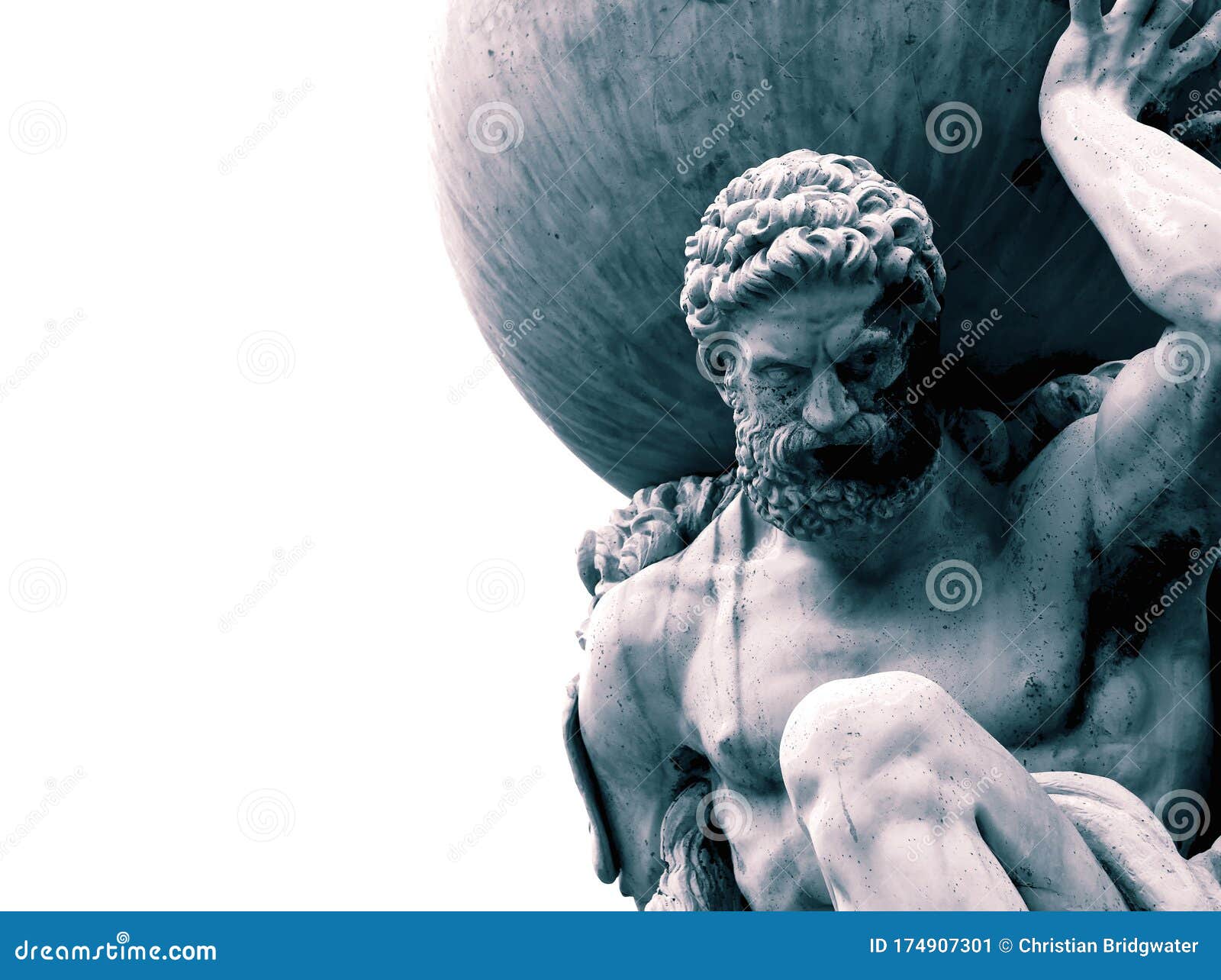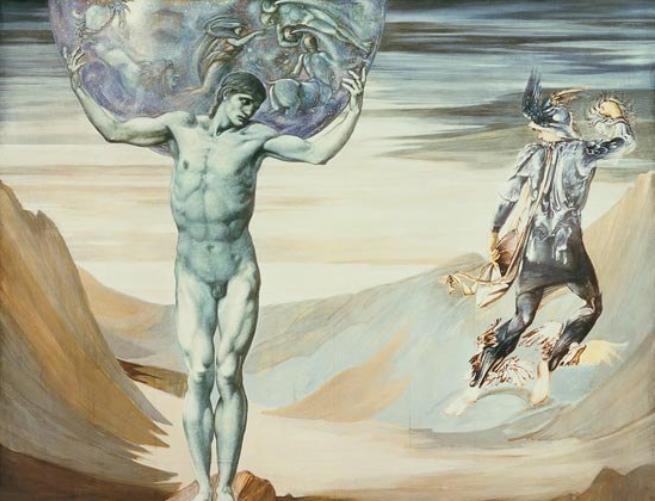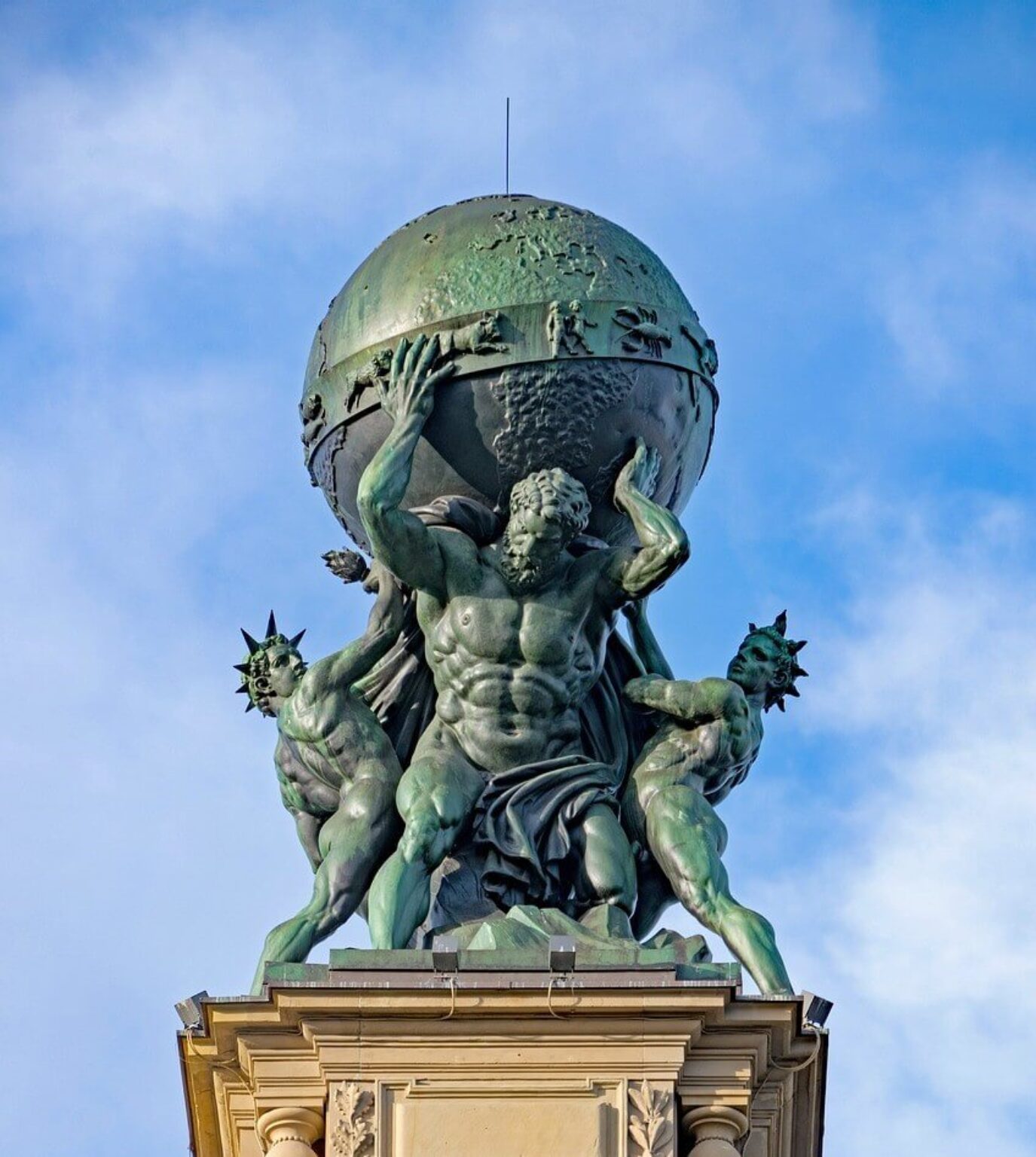
Atlas Titan Strength Greek Mythology Stock Illustration Download Image Now Globe
Atlas. Atlas was one of the most famous Titans, the son of Iapetus and the Oceanid Asia (or, possibly, Clymene ). He was the leader of the Titan rebellion against Zeus, and he got a fitting punishment after the end of the Titanomachy: he was condemned to eternally hold up the sky. Only once, and for a very brief period, he was bereaved of this.

Gustav Karl Martin Herold 18391927 Atlas, carrying the globe, supported by steam and
Atlas, in Greek mythology, son of the Titan Iapetus and the Oceanid Clymene (or Asia) and brother of Prometheus (creator of humankind). In Homer's Odyssey, Book I, Atlas seems to have been a marine creature who supported the pillars that held heaven and earth apart. These were thought to rest in the sea immediately beyond the most western horizon, but later the name of Atlas was transferred.

Statue of Atlas holding the celestial sphere (Farnese Atlas). Naples, National Archaeological
Atlas (Gr: Ἄτλας) is the titan of strength, endurance, heavy burdens, astronomy and the bearer of the sky. He prevents the collision of the skies and the earth. Iapetos and Klymene-Asie Pleione (wife), Hesperis (lover), Aithra (lover) • Dione • Kalypso (unknown mother) • Maira (unknown mother) • Hyas The Pleiades • Alkyone (with Pleione) • Elektra (with Pleione) • Kelaino.

Statue Of The Greek God Atlas Holding The Globe On His Shoulders. Stock Photo 174907301 Megapixl
The Atlantic Ocean is derived from Atlas' name. Atlas is believed to have stood in the ocean and lifted the heavens. Also, the name of the gargantuan mountain ranges in northwest Africa was derived from Atlas' name. Around the 16th century, geography expert Gerardus Mercator honored the Titan Atlas by naming his collection of maps after the.

Vintage Greek Titan Atlas Sculpture Chairish
In Greek mythology, Atlas ( / ˈætləs /; Greek: Ἄτλας, Átlas) is a Titan condemned to hold up the heavens or sky for eternity after the Titanomachy. Atlas also plays a role in the myths of two of the greatest Greek heroes: Heracles ( Hercules in Roman mythology) and Perseus.

Atlas was a Titan in Greek mythology tasked with holding up the heavens for all eternity. He's
Atlas, Epimetheus und Menoitios. Söhne der Titanen Iapetos und Klymene sind Prometheus, Epimetheus, Atlas und Menoitios. Epimetheus nahm trotz Warnung von Prometheus, kein Geschenk von Zeus anzunehmen, die von ihm gesandte Pandora zur Frau. Atlas trägt als Strafe für seine Teilnahme am Titanenkampf im Westen das Himmelsgewölbe.

God Atlas God Pictures Atlas tattoo, Greek mythology tattoos, Mythology art
Maia ist die Tochter des Titanen Atlas und Pleione und wird durch Zeus die Mutter des Hermes, der deshalb auch Maiadeus oder Maias hyios genannt wird. [1] [2] Sie ist die Nymphe des Kyllene-Gebirges, wo sie von Zeus geschwängert wurde. [3] [4] [5] Bei Sophokles hatte Hermes die Nymphe Kyllene zur Amme, als Maia erkrankt war [6] und nach der.

Atlas Titan World Free photo on Pixabay
In der griechischen Mythologie war Atlas ( Ἄτλας) ein Titan, der das Gewicht des Himmels auf seinen Schultern tragen musste. Diese Aufgabe war eine Strafe, die ihm von Zeus ( Ζεύς) auferlegt wurde.

Atlas Griechische Mythologie Wiki FANDOM powered by Wikia
In Greek mythology, the Titan Atlas was responsible for bearing the weight of the heavens on his shoulders, a burden given to him as punishment by Zeus.Father of many stars and a protagonist in one of Hercules' famous labours, Atlas was also known as a wise man and the founder of astronomy. For Plato, he was the eponymous first king of Atlantis, and this giant of a god also gave his name to a.

Amazon.de King Tut's Secret Atlas Skulptur H 31, 8 cm Griechische Gott von Himmel und Astronomie
In der griechischen Mythologie ist Atlas ein Titan, der zur Strafe für einen Aufstand gegen die Götter ein himmlisches Gewölbe um seinen Hals trägt. Er war der Sohn des Titanen Íapetus und der Klymene (Tochter des Titanen Okeanos). Seine Brüder waren Prometheus, Epimetheus und Menoitios.

Vintage Greek Titan Atlas Sculpture Atlas sculpture, Sculpture, Greek titans
Atlas is a figure from Greek mythology who is known for his role in supporting the heavens on his shoulders. He is typically depicted as a strong and powerful titan, often shown bearing the weight of the celestial sphere. Atlas is the son of the titan Iapetus and the nymph Clymene, and he is also the brother of Prometheus, Epimetheus, and.

Atlas God In greek mythology, atlas is a titan condemned to hold up the heavens or sky for
Atlas ( altgriechisch Ἄτλας Átlas, vom Wortstamm τλα wie in τλῆναι tlḗnai, deutsch ‚tragen, erdulden') ist in der griechischen Mythologie ein Titan, der das Himmelsgewölbe am westlichsten Punkt der damals bekannten Welt stützte. Er ist somit auch die Personifizierung des Atlasgebirges . Inhaltsverzeichnis 1 Mythos 1.1 Abstammung 1.2 Nachkommen

Atlas Titan of Endurance in Greek Mythology Symbol Sage
Atlas. Guardian Of The Pillars or Bearer of the Heavens. God of Astronomy. In Greek Mythology, Atlas was a Titan who was responsible for bearing the weight of the heavens on his shoulders, a punishment bestowed on him by Zeus. He was given this task in retribution for him leading the Titans into battle, or Titanomachy, against the Olympian Gods.

AtlasTitanHoldingKugelgriechische MythosIllustration Vektor Abbildung Illustration von
griechische Mythologie: Atlas. Atlas Als Sohn von Iapetos ( mit Themis, der Tochter Gaias ) zählt Atlas zu den Giganten. Zu seinen Geschwistern. Atlas stützt das Himmelsgewölbe auf der Erde stehend. Die meisten Darstellungen zeigen ihn allerdings - mythologisch falsch, aber mit höherer Symbolkraft - als Träger der Erdkugel.

Dekofigur Statue Skulptur Atlas griechische Mythologie 68,6 cm Amazon.de Küche & Haushalt
Wer ist Atlas?Warum trägt Atlas die Weltkugel?In diesem Video über Griechische Mythologie erfährst du es: Atlas vom Geschlecht der Titanen bewacht die Säulen.

Greek God Holding Up The World The Titan Atlas In Greek Mythology Owlcation Adrain Reichel
I. Griechische Geschichte S. 5 II. Antikes Kriegswesen allgemein S. 5 III. Pfeil und Bogen in der Antike S. 6 IV. Pfeil und Bogen bei Homer S. 9 V. Pfeil und Bogen in der griechischen Mythologie S. 10 Anhang Zeittafel zur griechischen Geschichte S. 11 Das vorliegende Werk wird von HistoFakt allen Interessierten kostenlos zur Verfügung gestellt.